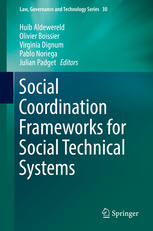

Most ebook files are in PDF format, so you can easily read them using various software such as Foxit Reader or directly on the Google Chrome browser.
Some ebook files are released by publishers in other formats such as .awz, .mobi, .epub, .fb2, etc. You may need to install specific software to read these formats on mobile/PC, such as Calibre.
Please read the tutorial at this link: https://ebookbell.com/faq
We offer FREE conversion to the popular formats you request; however, this may take some time. Therefore, right after payment, please email us, and we will try to provide the service as quickly as possible.
For some exceptional file formats or broken links (if any), please refrain from opening any disputes. Instead, email us first, and we will try to assist within a maximum of 6 hours.
EbookBell Team

4.4
42 reviewsThis book addresses the question of how to achieve social coordination in Socio-Cognitive Technical Systems (SCTS). SCTS are a class of Socio-Technical Systems that are complex, open, systems where several humans and digital entities interact in order to achieve some collective endeavour. The book approaches the question from the conceptual background of regulated open multiagent systems, with the question being motivated by their design and construction requirements. The book captures the collective effort of eight groups from leading research centres and universities, each of which has developed a conceptual framework for the design of regulated multiagent systems and most have also developed technological artefacts that support the processes from specification to implementation of that type of systems. The first, introductory part of the book describes the challenge of developing frameworks for SCTS and articulates the premises and the main concepts involved in those frameworks. The second part discusses the eight frameworks and contrasts their main components. The final part maps the new field by discussing the types of activities in which SCTS are likely to be used, the features that such uses will exhibit, and the challenges that will drive the evolution of this field.